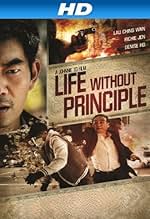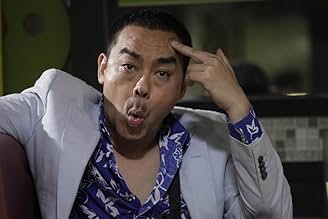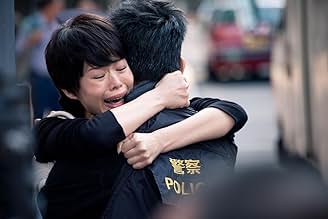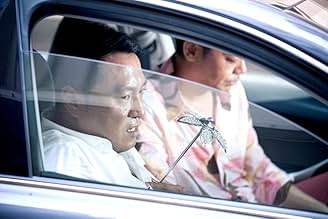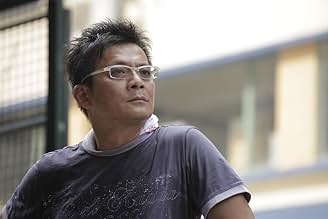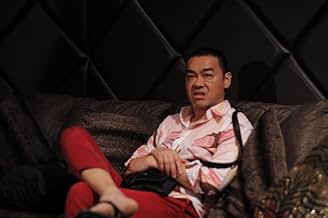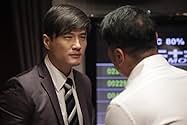IMDb रेटिंग
6.9/10
2.9 हज़ार
आपकी रेटिंग
अपनी भाषा में प्लॉट जोड़ेंThree people - a criminal, a bank officer and a cop - end up in a catastrophic situation in the midst of a global economical crisis and are forced to betray any morals and principles to solv... सभी पढ़ेंThree people - a criminal, a bank officer and a cop - end up in a catastrophic situation in the midst of a global economical crisis and are forced to betray any morals and principles to solve their financial problems.Three people - a criminal, a bank officer and a cop - end up in a catastrophic situation in the midst of a global economical crisis and are forced to betray any morals and principles to solve their financial problems.
- पुरस्कार
- 17 जीत और कुल 28 नामांकन
Ching-Wan Lau
- Panther
- (as Ching Wan Lau)
Richie Jen
- Inspector Cheung
- (as Richie Ren)
Eddie Cheung
- Wah
- (as Siu-Fai Cheung)
Siu-Kay Lee
- Brother Four
- (as Siu-Kei Lee)
फ़ीचर्ड समीक्षाएं
This is certainly a departure from Johnnie To's usual work, but nonetheless, it is a film that is easy to like and relate. With the Greek financial crisis as the backdrop for a story about greed, human nature and life. It is one of those films that does not feel like a complete episode, but rather the sums of its parts. What I like about To's film is that they are so efficient and there is also recurring themes in all his films – life is about taking chances, random events of luck, expect the unexpected and the human nature of greed. His ability to present simple stories into a smooth cinematic experience is simply wonderful to endure. Although the film breaks no new grounds on the topic of greed in the financial market and especially Hong Kong people, it is still a worthy addition to 2011's HK cinema. Perhaps two words that best describe this film would be - simple and efficient. After all, as Mr. Geeko used to say - "Greed is good"...
Neo rates it 7.5/10
Neo rates it 7.5/10
- www.thehkneo.com
The long-gestating Johnnie To movie 'Life Without Principle' chooses as its theme the interminable greed of mankind, set against the backdrop of the current financial crisis. Taking almost three years for the auteur to get it off the page onto the screen, it is also his most narratively complex film since 'Election', intertwining the stories of a bank employee, a cop and two triad gangsters over the course of one fateful day when the Greek economy essentially goes 'kaput'.
Unfolding quite independently of each other at first, To requests the patience of his audience as he slowly builds up each narrative thread to flesh out the key characters. First in line is bank employee Teresa (Denise Ho), who is under pressure from the team manager to meet her sales targets for a new complex financial product before the New Year. She makes cold calls from a list of bank customers, the derision she faces enough to make one think twice about being mean to the person on the other end of the line in similar real-life situations.
The focus of this segment is Teresa's persuasion of an elderly woman (So Hang-Shuen) to invest her life savings into a high-risk fund, despite the mismatch between the investment product and the client's risk appetite. The client laments about the bank's low interest rates on deposits, and Teresa sees an opportunity to be less than scrupulous- despite her nagging conscience. This is certainly a parallel between this and our very own DBS 'High Notes 5' saga not too long ago- and To mines the realities of this sequence to highlight the pitfalls many ordinary citizens often fall into when making poorly informed investment decisions.
To also uses this segment to introduce two supporting characters- the balding loan shark Yuen (Lo Hoi-Pang) who gets robbed immediately after withdrawing five million from the bank; and the soon-to-be-married Connie (Myolie Wu) frustrated at her fiancée's reluctance at buying an apartment for investment. Yuen will figure later in the second story thread led by triad runner Panther (Lau Ching Wan) and his buddy Lung (Philip Keung), who runs an illegal business operation dabbling in Internet stock trading.
Thanks to Lau's fine turn playing the exceedingly righteous Panther with just the right balance of levity and gravity, this is easily the most colourfully entertaining segment- and because of the gangster milieu also the one which To's fans will find most familiar. Using the first half to emphasise Panther's servility as he tries to post bail for a fellow triad honcho (Eddie Cheung), To's investment in character development pays off in understanding Panther's loyalty to Lung and the extent he is willing to go to help Lung out of his financial doldrums.
The third, and perhaps least developed, story concerns Inspector Cheung (Ritchie Jen), whose dedication to his work is another reason for his fiancé Connie's frustration. Though Cheung is seen earlier crossing paths with Panther, it is Cheung's heroism saving another elderly man from committing suicide and his subsequent change in perspective that this segment is concerned with- though there Is a severely undercooked subplot involving Cheung's father's death from cancer and the fate of his young half-sister. This and the other two seemingly disparate plot threads only coalesce towards the last half hour of the film- but rest assured that To rewards your patience with a riveting conclusion that connects the various characters brilliantly, albeit with some degree of deus ex machina especially towards the end.
But beyond the plotting, To's film is also extremely meaningful as a reflection of the interconnectedness of our livelihoods with the ups and downs of the world economy. Bearing great thematic relevance and prescience, the movie paints a stark picture of how the very wellbeing of ordinary and disparate folk can be affected so drastically by something happening on a different continent. It is also not afraid to expose the flaws within the growing complexities of our financial industries, which entraps the sweat-soaked dollars and cents of good hardworking people.
If the above discourse on the film's themes isn't yet clear enough, then let us also state categorically that those looking for To's trademark shoot-em-up actioners will likely be disappointed. There is nary a shootout in sight, nor a bullet fired for that matter, but To's gamble to attempt a multi-strand narrative built around pertinent social issues (think 'Traffic', 'Crash' or even this autumn's 'Contagion') pays off handsomely- thanks also to solid acting from To's usual band of regulars and some expert editing from David Richardson. As the fruit of To's labour for the past three years, it also reaffirms his position as one of the best, if not the best, directors in Hong Kong today.
Unfolding quite independently of each other at first, To requests the patience of his audience as he slowly builds up each narrative thread to flesh out the key characters. First in line is bank employee Teresa (Denise Ho), who is under pressure from the team manager to meet her sales targets for a new complex financial product before the New Year. She makes cold calls from a list of bank customers, the derision she faces enough to make one think twice about being mean to the person on the other end of the line in similar real-life situations.
The focus of this segment is Teresa's persuasion of an elderly woman (So Hang-Shuen) to invest her life savings into a high-risk fund, despite the mismatch between the investment product and the client's risk appetite. The client laments about the bank's low interest rates on deposits, and Teresa sees an opportunity to be less than scrupulous- despite her nagging conscience. This is certainly a parallel between this and our very own DBS 'High Notes 5' saga not too long ago- and To mines the realities of this sequence to highlight the pitfalls many ordinary citizens often fall into when making poorly informed investment decisions.
To also uses this segment to introduce two supporting characters- the balding loan shark Yuen (Lo Hoi-Pang) who gets robbed immediately after withdrawing five million from the bank; and the soon-to-be-married Connie (Myolie Wu) frustrated at her fiancée's reluctance at buying an apartment for investment. Yuen will figure later in the second story thread led by triad runner Panther (Lau Ching Wan) and his buddy Lung (Philip Keung), who runs an illegal business operation dabbling in Internet stock trading.
Thanks to Lau's fine turn playing the exceedingly righteous Panther with just the right balance of levity and gravity, this is easily the most colourfully entertaining segment- and because of the gangster milieu also the one which To's fans will find most familiar. Using the first half to emphasise Panther's servility as he tries to post bail for a fellow triad honcho (Eddie Cheung), To's investment in character development pays off in understanding Panther's loyalty to Lung and the extent he is willing to go to help Lung out of his financial doldrums.
The third, and perhaps least developed, story concerns Inspector Cheung (Ritchie Jen), whose dedication to his work is another reason for his fiancé Connie's frustration. Though Cheung is seen earlier crossing paths with Panther, it is Cheung's heroism saving another elderly man from committing suicide and his subsequent change in perspective that this segment is concerned with- though there Is a severely undercooked subplot involving Cheung's father's death from cancer and the fate of his young half-sister. This and the other two seemingly disparate plot threads only coalesce towards the last half hour of the film- but rest assured that To rewards your patience with a riveting conclusion that connects the various characters brilliantly, albeit with some degree of deus ex machina especially towards the end.
But beyond the plotting, To's film is also extremely meaningful as a reflection of the interconnectedness of our livelihoods with the ups and downs of the world economy. Bearing great thematic relevance and prescience, the movie paints a stark picture of how the very wellbeing of ordinary and disparate folk can be affected so drastically by something happening on a different continent. It is also not afraid to expose the flaws within the growing complexities of our financial industries, which entraps the sweat-soaked dollars and cents of good hardworking people.
If the above discourse on the film's themes isn't yet clear enough, then let us also state categorically that those looking for To's trademark shoot-em-up actioners will likely be disappointed. There is nary a shootout in sight, nor a bullet fired for that matter, but To's gamble to attempt a multi-strand narrative built around pertinent social issues (think 'Traffic', 'Crash' or even this autumn's 'Contagion') pays off handsomely- thanks also to solid acting from To's usual band of regulars and some expert editing from David Richardson. As the fruit of To's labour for the past three years, it also reaffirms his position as one of the best, if not the best, directors in Hong Kong today.
- www.moviexclusive.com
Crime drama surrounding financial crisis's , with classic Johnnie To themes ...
------- Movie follows multiple characters (officer, bank clerk, gangster) connected to a loan shark's death . 10 million dollars are missing in the process ..
Same time officer's wife and their foster child are looking for a home in an unstable housing market.. The bank clerk is signing people up for high-risk investments that are bound to fail.. And the gangster has luck for being the bail-out service boy , sole purpose to bail other gangsters out of the trouble they cause for themselves ..
Some investigating, robberies, car break-ins, funny police arrests, rose-petal daggers, stolen money femme ...... Johnnie To elements ..
7/10
------- Movie follows multiple characters (officer, bank clerk, gangster) connected to a loan shark's death . 10 million dollars are missing in the process ..
Same time officer's wife and their foster child are looking for a home in an unstable housing market.. The bank clerk is signing people up for high-risk investments that are bound to fail.. And the gangster has luck for being the bail-out service boy , sole purpose to bail other gangsters out of the trouble they cause for themselves ..
Some investigating, robberies, car break-ins, funny police arrests, rose-petal daggers, stolen money femme ...... Johnnie To elements ..
7/10
10lyx-1
I really don't understand the low ratings for this superb film. This is one of the most brilliant films about the current state of the world as reflected in Hong Kong society I've seen, especially as an indictment against the financial markets and banks, as exemplified in the cold reptilian nature of the female banker. The non-plot is seamlessly woven, though there's a tribute to Kieslowski here, and To coaxed great performances from most of his cast. The interwoven lives are gripping in their own roller-coaster way, as fortunes ride up and down not unlike the stock market. The only disappointment for me was the ending - I did not expect that of To, but again, it could have been the nod to Kieslowski that he wrapped it up the way he did.
Johnnie To, the Godfather of Hong Kong, is the doughtiest and arguably the only Hong Kong film auteur still safeguards the pedigree of the untainted spirit from its halcyon days, after the detrimental ramifications of the censorship battlefield with mainland Chinese policy, which put Hong Kong film industry into a retrograde quagmire, only from Johnnie To's prolific output one (especially for those who has witnessed or influenced by Hong Kong films' golden era, e.g. 1980-1997) can retrieve some salve from the bleak situation (underpins by the poignant slogan "Hong Kong Film is Dead!).
LIFE WITHOUT PRINCIPLE has its clear-sighted objective dispassionateness, adopts 3 discrete narratives from a cop, a bank clerk and a Triad member (with tentative overlays) all converge with a parking lot homicide case, and intriguingly delineates the current situation in Hong Kong society under the background of Greece's ecumenic catastrophe, which reflects the anxiety and levity in normal citizens' mind set. A dowdy retired housewife falls prey to the callous investment chicanery, a vivid mirror image of millions of ourselves, bank system embezzles people's hard-earned savings, benefits from the (almost inclusive) profit while shunts all the risky liabilities to each account holder, a deep-rooted capitalism scourge on the modern society. Veteran actress Hang Shuen So conducts a visceral impersonation using her meager appearance as the cipher victim. Denise Ho (an out-of-the-closet lesbian singer and new actress) garnishes the office-confined monotony with her restrained tolerance and discontentment as the conscientious clerk, a subdued archetypal in the white-collar hierarchy.
Versatile actor Ching Wan Lau is the Triad minion, pious to his boss and brothers, although time changes, the Triad business are at the low ebb now, but his foolhardiness resists with a perverse tenderness, in a time when brotherhood can be easily teased as homo-erotic metonymy, his loyalty is far-fetched but resonates with the gangster nostalgia which permeates the genre's best moments (To's ELECTION 2005, 8/10 and TRIAD ELECTION 2006, 8/10 are among the swan songs), Ching Wan Lau experiments a methodological mimicry with blinking-laden vivacity in his character's naive and befuddled persistence.
The third thread germinates from Richie Ran's cop, which ruefully is the weakest link and casts a shadow to the development of the character's below-the-surface tension, the elevator incident with explosive serves the only chilly thrill of the film which feels insatiable for To's generic followers.
The ending mercifully caters for a interim reprieve to the 3 protagonists, but To seems to be as unconvincing as the audiences, the fluke (gamble) is not an elixir, the stopgap is rickety, everyone is still caught in the spiderweb and the exit sign seems too far to reach.
LIFE WITHOUT PRINCIPLE has its clear-sighted objective dispassionateness, adopts 3 discrete narratives from a cop, a bank clerk and a Triad member (with tentative overlays) all converge with a parking lot homicide case, and intriguingly delineates the current situation in Hong Kong society under the background of Greece's ecumenic catastrophe, which reflects the anxiety and levity in normal citizens' mind set. A dowdy retired housewife falls prey to the callous investment chicanery, a vivid mirror image of millions of ourselves, bank system embezzles people's hard-earned savings, benefits from the (almost inclusive) profit while shunts all the risky liabilities to each account holder, a deep-rooted capitalism scourge on the modern society. Veteran actress Hang Shuen So conducts a visceral impersonation using her meager appearance as the cipher victim. Denise Ho (an out-of-the-closet lesbian singer and new actress) garnishes the office-confined monotony with her restrained tolerance and discontentment as the conscientious clerk, a subdued archetypal in the white-collar hierarchy.
Versatile actor Ching Wan Lau is the Triad minion, pious to his boss and brothers, although time changes, the Triad business are at the low ebb now, but his foolhardiness resists with a perverse tenderness, in a time when brotherhood can be easily teased as homo-erotic metonymy, his loyalty is far-fetched but resonates with the gangster nostalgia which permeates the genre's best moments (To's ELECTION 2005, 8/10 and TRIAD ELECTION 2006, 8/10 are among the swan songs), Ching Wan Lau experiments a methodological mimicry with blinking-laden vivacity in his character's naive and befuddled persistence.
The third thread germinates from Richie Ran's cop, which ruefully is the weakest link and casts a shadow to the development of the character's below-the-surface tension, the elevator incident with explosive serves the only chilly thrill of the film which feels insatiable for To's generic followers.
The ending mercifully caters for a interim reprieve to the 3 protagonists, but To seems to be as unconvincing as the audiences, the fluke (gamble) is not an elixir, the stopgap is rickety, everyone is still caught in the spiderweb and the exit sign seems too far to reach.
क्या आपको पता है
- ट्रिवियाDebuted at the second spot of the Hong Kong box office and held the position in its second week.
- कनेक्शनReferenced in Mo ngai: To Kei Fung dik din ying sai gaai (2013)
टॉप पसंद
रेटिंग देने के लिए साइन-इन करें और वैयक्तिकृत सुझावों के लिए वॉचलिस्ट करें
- How long is Life Without Principle?Alexa द्वारा संचालित
विवरण
- रिलीज़ की तारीख़
- कंट्री ऑफ़ ओरिजिन
- आधिकारिक साइटें
- भाषा
- इस रूप में भी जाना जाता है
- Life Without Principle
- उत्पादन कंपनियां
- IMDbPro पर और कंपनी क्रेडिट देखें
बॉक्स ऑफ़िस
- दुनिया भर में सकल
- $12,03,873
- चलने की अवधि
- 1 घं 47 मि(107 min)
- रंग
- ध्वनि मिश्रण
- पक्ष अनुपात
- 2.35 : 1
इस पेज में योगदान दें
किसी बदलाव का सुझाव दें या अनुपलब्ध कॉन्टेंट जोड़ें


